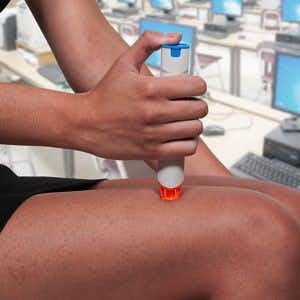
People who are allergic to bee or wasp stings, peanuts, shrimp or other foods rely on an auto-injector containing epinephrine (adrenaline) to open their airways and keep them breathing until emergency help can arrive. Without a shot of epinephrine, people in anaphylactic shock are left gasping for air and in cardiovascular collapse.
EpiPen to the Rescue:
For years, the EpiPen Auto-Injector was considered a staple for such vulnerable patients. Recently, however, the price has skyrocketed. In 2007 the average wholesale price of a two-injector pack was under $100. Now the price is around $600. Families may need multiple units so children can be protected at home, at school and other locations.
This drug is not discretionary. It is literally a lifeline for people vulnerable to anaphylactic shock. What makes this unique is that there is no competition, even though epinephrine is a very old drug. The pre-measured dose is easily injected with the device. The EpiPen is much safer to use than a standard syringe, where the dose has to be calculated during an emergency.
Mylan’s Reaction to the Controversy:
Because of the firestorm of criticism the company has faced, Mylan announced that it would offer discount coupons worth $300 “for patients in health plans who face higher out-of-pocket costs.” No announcement has been made about rolling back the $600 price tag despite criticism from doctors, the AMA and members of Congress.
Coupons may be a way to dampen down the outrage that has bubbled up over the last week. Pricing within the pharmaceutical industry is the opposite of transparent. All sorts of deals get made behind closed doors with pharmacy chains, insurance companies, HMOs and other payers. There are rebates and coupons and bizarre arrangements that are an accountant’s dream come true because they are so complex no one else could make much sense of them.
Deja Vu All Over Again:
The price increases in the EpiPen case are somewhat reminiscent of another old drug, Daraprim. That medication went from $13.50 a pill to over $700 and stimulated an outcry from the public, Congress and government regulators. Martin Skhreli, the ex-CEO of Turing Pharmaceuticals, became one of the most vilified drug company execs in recent memory when he defended the 5,000 percent price jump of Daraprim. Now Mr. Skhreli is defending Mylan’s price increase for EpiPen even though he has no relationship with the company. We’re not sure such a vote of confidence from Martin Skhreli should reassure Mylan.
What Should EpiPen Cost?
What is the cost of EpiPen in other countries? PharmacyChecker.com does cost comparisons of online Canadian drugstores. Many of these pharmacies cooperate with drugstores in other countries including Australia, New Zealand, Barbados and the United Kingdom. It turns out that one EpiPen costs about $115 shipped to the U.S. Two injectors would be roughly $180 to $250. That’s not inexpensive, but it is way less than the $600 they cost in the U.S. Once again we are reminded that Americans pay substantially more for medicines than people in other countries.
Understanding the Insanity of Drug Pricing:
To learn more about the bizarre world of drug prices and online Canadian pharmacies you may want to check out our recently revised 20-page Guide to Saving Money on Medicines. We describe such crazy price increases in detail and offer tips about what people can do about them.
We would also like your thoughts on the EpiPen controversy and drug pricing in general below in the comment section.

